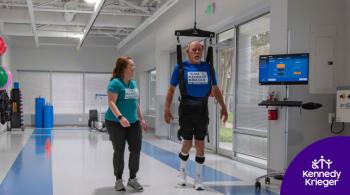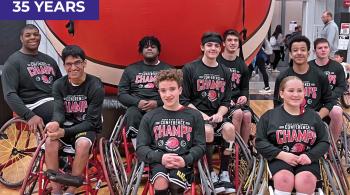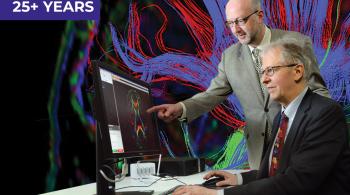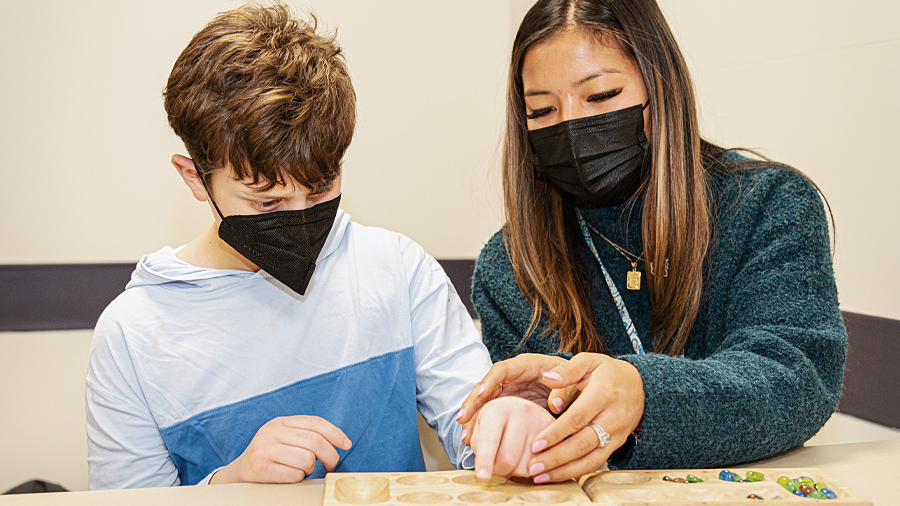
By Laura Thornton
Jack, 12, loves toys and puzzles, music and dancing, and swimming in the ocean. He loves car rides, being read to, and playing games on his iPad. And he absolutely loves school.
“He’s so happy when he comes off the bus at the end of the day,” says his mom, Julie. That’s how she knows he’s had a great day at school.
Jack attends Kennedy Krieger Institute’s Powder Mill Campus school in Prince George’s County, Maryland, which serves students with intellectual disabilities in grade two through age 21. This past August, the school moved into a new building. “When I toured the new school, I cried—it’s outfitted with everything the kids need,” Julie says. “It was so nice to walk around a beautiful building and see all these wonderful rooms for the kids.”
Transitions are tough for Jack, but Jack’s teacher, principal and therapists soon reported that Jack was loving the new space, clapping his hands and smiling under his face mask. “I can see the twinkle in Jack’s eyes and the excited expression on his face when he’s walking down the hallways,” Principal Julie Kim says. “He really enjoys being here.”
“He’s just so happy to come to school every day.” – Jessica Berry, Jack’s teacher
“He’s just so happy to come to school every day,” adds Jessica Berry, his teacher. “Sometimes, we even have to remind him to calm down and take some deep breaths, because he’s laughing so much.”
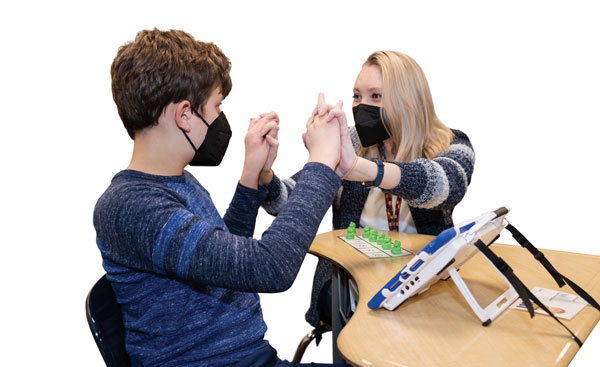
A Complex Diagnosis
Jack was diagnosed with autism spectrum disorder (ASD) when he was 3, but it wasn’t until he was 9 that he was also diagnosed with SYNGAP1-related intellectual disability. SYNGAP1 is a gene that makes a protein (SynGAP) that is important for proper brain function, explains neurologist Dr. Constance Smith-Hicks, director of Kennedy Krieger’s SYNGAP1 Center of Excellence and medical director of Kennedy Krieger’s Center for Autism and Related Disorders.
“Some variants in the SYNGAP1 gene can disrupt protein function,” she explains. “When this happens, individuals may have disruptive behaviors, sleep problems, epilepsy and impairment in cognitive function.” ASD is also common among people with SYNGAP1-related intellectual disability. Only about 600 people in the world have been diagnosed with the disorder.
Jack and his family live in Montgomery County, Maryland, and his parents worked hard to find just the right school for him. “We were overjoyed when we got a spot at Kennedy Krieger” in January 2020, Julie recalls. “It was like winning the special needs lottery.” At the end of Jack’s first day, his teachers “focused on the positive, which was really heartwarming,” Julie says. “They told me all that he’d accomplished that day. I just had a really good feeling about the placement.”
It wasn’t their first experience with the Institute. After Jack’s SYNGAP1 diagnosis, they learned that one of the country’s few designated SYNGAP1 Centers of Excellence was just up the road in Baltimore, at Kennedy Krieger.
“We thought, ‘What luck! It’s practically in our backyard!’” They immediately got in touch with Dr. Smith-Hicks, who now evaluates Jack each year and oversees his SYNGAP1 care.
Recently, Jack started seeing Dr. Jay Salpekar, director of the Institute’s Neuropsychiatry in Epilepsy Program. “Sometimes, Jack’s tolerance of stressors and flexibility for adjusting to new circumstances are low,” Julie explains. “Medication can help with his attention and behavior, but he’s very sensitive to medications and their side effects,” so Dr. Salpekar tweaks Jack’s medications as needed.
Working with Jack’s entire care and education team, “I collect as much data as possible about Jack, and tailor a treatment plan that targets all of Jack’s challenges at any given time,” he explains.
Last year, Dr. Marian Galan-Torres, supervising psychologist for the Institute’s Pediatric Developmental Disabilities Clinic, began working with Jack’s family to develop behavioral strategies for helping Jack master self-care routines and behavior management. “We put a treatment plan of behavioral strategies in place that are effective, but which require significant parent support and commitment,” Dr. Galan-Torres says. “Jack’s parents were so on board with everything I recommended and worked so hard with these strategies that within a month, we started seeing so much improvement in Jack.”
An Incredible Interdisciplinary Team
A couple of months after Jack started school at Kennedy Krieger, the school switched from in-person to virtual learning due to the COVID-19 pandemic. Julie wasn’t sure if Jack would be able to learn from home, but ultimately found herself extremely impressed at how far he was able to come during that time. “When we were virtual, we were in extremely close contact with his team at school. I was floored by their energy and dedication to all of their students.”
Initially, Jack didn’t understand why he had to attend school from home, in front of a computer. But within a few months, “He would hear his teacher’s voice on the computer and come running over to respond to her,” Julie says. The following spring, Jack was in school for part of each week, on a hybrid schedule, and by the summer, he was back to in-person learning every day.
Dr. Liz Wohlberg, Jack’s physical therapist, works with Jack twice a week, helping him with coordination, balance and core strength. “Working with Jack really challenged me to think outside of the box,” she says. “From his intake with us, I knew Jack would not respond as well to traditional therapy, but I wasn’t sure what would work for him. I began to research SYNGAP1 so I could understand what areas of his brain were affected and how.”
Using that research, Dr. Wohlberg prepared a virtual presentation on Jack and SYNGAP1-related intellectual disability and provided it to his entire education and care team at school. “SYNGAP1 affects every function of the brain,” she explains. “With some brain disorders, the part of the brain that is affected is known, and we can treat the impairment based on that knowledge. With SYNGAP1, all the areas of the brain are affected, but we don’t necessarily know how. So we have to stimulate all areas of Jack’s brain to make progress.”
“They genuinely care about Jack.” – Julie, Jack’s mom
“Jack’s team at school does such a great job in breaking down instruction in a way that makes sense to Jack, so he can remain engaged and motivated to participate,” Julie says. “They’re always willing to adjust their plans to accommodate his unique learning needs. They genuinely care about Jack.”
Jack has worked closely with speech-language pathologist and assistive technology specialist Kara Miller for speech therapy and to learn how to use a special iPad app to communicate. “His hands and fingers learn how to ‘say’ a word through pushing certain buttons in the same order, and he gets better through practice,” Miller explains. “He likes using buttons with both pictures and words on them to make requests, greet others and respond to questions, and often types for fun.”
Twice a week, Jack sees occupational therapist Lizzie Orr, who’s been helping Jack develop the fine motor strength and coordination skills needed to navigate his iPad and other classroom materials with increased independence. “Jack is incredibly smart and shows great motivation to participate in the activities we do together to target his fine motor needs. His favorite activities include puzzles, marbles and pop tubes, and matching letter stickers. He brings positive energy into our sessions, and it’s been such a pleasure working with Jack, his team and his family.”
Berry, Kim, Orr, Miller and Dr. Wohlberg collaborate closely to ensure that all of Jack’s needs are being met throughout the school day. There are only five other kids in Jack’s classroom, which allows for plenty of individualized instruction. And in one corner of the classroom, Berry has created a special leisure area for her students, with books, toys and a rug to sit on. “He loves spending time there,” she says.

Looking Ahead
In addition to being a student and patient at Kennedy Krieger, Jack also participates in research studies designed to learn more about SYNGAP1-related intellectual disability. “We are interested in understanding how the genetic variations affect individuals, with the goal of informing care and guiding treatment strategies,” says Dr. Smith-Hicks, who directs SYNGAP1 research at the Institute. “We’re studying some of the common challenges seen with SYNGAP1—sleep, learning difficulties and behavior—and we’re very excited about what we’re finding.”
Jack’s twin brother, Aidan, who does not have SYNGAP1, has also participated in research, as part of a neurotypical “control” group. “By participating in research studies, you’re helping the greater community in getting closer to treatments that may impact not only a small patient population, but also potentially a much wider group of people with related disorders,” Julie says. “Participating in a study may seem like one more thing to do in your day, but the only way we can improve quality of life for all is if we all participate in research.”
Julie’s current goals for Jack are that he’s happy and as independent as possible. Looking ahead, “I want Jack to be able to have meaningful employment and leisure activities that keep him happy and healthy. Thanks to Kennedy Krieger, I’m hopeful he’ll achieve that.”

